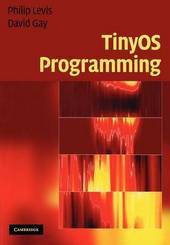
|
TinyOS Programming
Paperback / softback
Main Details
| Title |
TinyOS Programming
|
| Authors and Contributors |
By (author) Philip Levis
|
|
By (author) David Gay
|
| Physical Properties |
| Format:Paperback / softback | | Pages:282 | | Dimensions(mm): Height 248,Width 174 |
|
| Category/Genre | Computer programming and software development |
|---|
| ISBN/Barcode |
9780521896061
|
| Classifications | Dewey:005.432 |
|---|
| Audience | | Professional & Vocational | |
|---|
| Illustrations |
5 Halftones, unspecified
|
|
Publishing Details |
| Publisher |
Cambridge University Press
|
| Imprint |
Cambridge University Press
|
| Publication Date |
12 March 2009 |
| Publication Country |
United Kingdom
|
Description
Do you need to know how to write systems, services, and applications using the TinyOS operating system? Learn how to write nesC code and efficient applications with this indispensable guide to TinyOS programming. Detailed examples show you how to write TinyOS code in full, from basic applications right up to new low-level systems and high performance applications. Two leading figures in the development of TinyOS also explain the reasons behind many of the design decisions made and, for the first time, how nesC relates to and differs from other C dialects. Handy features such as a library of software design patterns, programming hints and tips, end-of-chapter exercises, and an appendix summarizing the basic application-level TinyOS APIs make this the ultimate guide to TinyOS for embedded systems programmers, developers, designers, and graduate students.
Author Biography
Philip Levis is Assistant Professor of Computer Science and Electrical Engineering at Stanford University. A Fellow of the Microsoft Research Faculty, he is also Chair of the TinyOS Core Working Group and a Member of the TinyOS Network Protocol (net2), Simulation (sim), and Documentation (doc) Working Groups. David Gay joined Intel Research in Berkeley in 2001 where he has been a designer and the principal implementer of the nesC language, the C dialect used to implement the TinyOS sensor network operating system, and its applications. He has a diploma in Computer Science from the Swiss Federal Institute of Technology in Lausanne and a Ph.D. from the University of California, Berkeley.
|